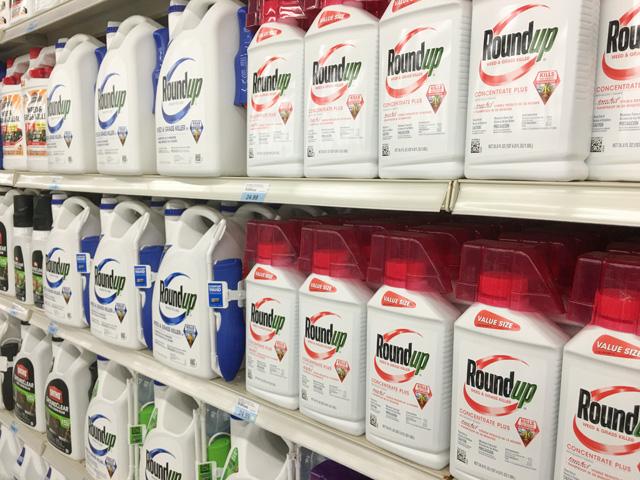Supreme Court Rejects Roundup Petition
SCOTUS Rejects Roundup Case
LINCOLN, Neb. (DTN) -- The Supreme Court on Monday rejected Bayer AG's petition to review a $25 million Roundup product-liability verdict issued by a California court.
In 2019, a jury awarded Edwin Hardeman $80 million in damages after the ruling his non-Hodgkin's lymphoma was caused by his use of Roundup. The damages later were reduced to $25 million.
Bayer argued in its petition to the Supreme Court that the Federal Insecticide, Fungicide and Rodenticide Act, or FIFRA, bars states from adding new label requirements. Bayer has argued federal law pre-empts state law when it comes to Roundup labels.
The court didn't agree. The ruling currently does not affect Roundup's availability to farmers.
The ruling comes just days after the Ninth Circuit Court of Appeals in California rejected EPA's analysis for determining that glyphosate is likely not carcinogenic and ordered EPA to reevaluate its conclusions. https://www.dtnpf.com/…
Bayer said in a statement to DTN it "respectfully disagrees" with the Supreme Court's decision.
"The company believes that the decision undermines the ability of companies to rely on official actions taken by expert regulatory agencies, as it permits every U.S. state to require a different product label, which conflicts with the clear intent of the 'uniformity clause' adopted by the U.S. Congress in FIFRA and similar statutes," the company said in a statement."
Bayer added there will likely be future cases sent to the Supreme Court with similar questions related to federal versus state jurisdiction.
"While this decision brings an end to the Hardeman case, there are likely to be future cases, including Roundup cases, that present the U.S. Supreme Court with preemption questions like Hardeman and could also create a circuit split. The company is strongly encouraged by the widespread support from public officials, agricultural organizations and other stakeholders following the U.S. government's legal reversal in Hardeman."
Bayer also noted how farm groups opposed the solicitor general's brief over science-based regulations.
P[L1] D[0x0] M[300x250] OOP[F] ADUNIT[] T[]
"These third parties expressed opposition to the solicitor general's brief and raised significant concerns that it departed from science-based regulation, could exacerbate food shortages at a critical time, threatened environmental sustainability and was prepared without consultation with the U.S. Department of Agriculture which has a vital interest in the outcome of the case."
In July 2021, Bayer announced a five-point plan to manage and resolve future litigation risk from Roundup. Among the moves, Bayer said it would stop selling Roundup products for residential use beginning in 2023.
As part of the 2021 Bayer announcement the company said it would be setting aside about $4.5 billion for potential future legal claims and settlements if the Supreme Court did not agree to a review. That would put the total payout of Roundup claims at more than $14 billion.
Bayer has settled about 107,000 cases out of 138,000. The U.S. District Court for the District of Northern California last year rejected the $2 billion settlement, expressing concern it would not adequately address the concerns of families who may later be diagnosed with non-Hodgkin's lymphoma.
"The voluntary claims resolution program for the U.S. Roundup product-liability litigation is a key element of the company's five-point plan to help bring closure to the litigation in the United States," Bayer said in a statement.
"The company is fully prepared to launch the claims resolution program, but that decision will depend on key developments in the litigation, including trials and appeals."
Bayer said it is "confident" the "extensive body of science and consistently favorable views" from regulatory bodies across the world "provide a strong foundation on which it can successfully defend Roundup in court when necessary. The company will only consider resolving outstanding current cases and claims if it is strategically advantageous to do so."
Bayer officials told DTN in recent weeks it is weighing what the ruling means for companies in terms of the costs to bring products to market, and their ability to depend on consistent federal oversight and uniform regulations governing ag chemicals.
Last week a jury in Jackson County, Oregon, found Roundup didn't cause a man's cancer.
It is the fourth case in a row that Bayer has won in less than a year, with the company dealing with a wave of claims since it took over Monsanto Co., the product's original owner, in 2018.
In an earlier ruling, a jury in Jackson County, Missouri, on June 9 ruled the glyphosate-based Roundup did not cause non-Hodgkin's lymphoma in plaintiff Allan Shelton. Last year, two other juries sided with Bayer in other similar cases in California.
Also two weeks ago, the European Chemical Agency found no scientific link between glyphosate use and cancer, https://echa.europa.eu/…
The Biden administration drew the ire of agriculture groups and federal lawmakers, when the U.S. solicitor general issued a brief on the Hardeman case calling for the Supreme Court to reject the Bayer petition, https://www.dtnpf.com/…
Bayer also petitioned the court to review a verdict in a Roundup product liability case, Pilliod v Monsanto.
In addition, a lawsuit filed by Georgia Roundup plaintiff John Carson also may find its way to the Supreme Court.
On June 8, Bayer urged the U.S. Court of Appeals for the 11th Circuit in Atlanta to rule state law failure-to-warn claims are preempted by federal law. Such a ruling would be in conflict with a previous ruling by the U.S. Court of Appeals for the Ninth Circuit in California and likely would send the case to the Supreme Court.
Read more on DTN:
"Bayer Awaits SCOTUS Decision on Roundup," https://www.dtnpf.com/….
Todd Neeley can be reached at todd.neeley@dtn.com
Follow him on Twitter @DTNeeley
(c) Copyright 2022 DTN, LLC. All rights reserved.






